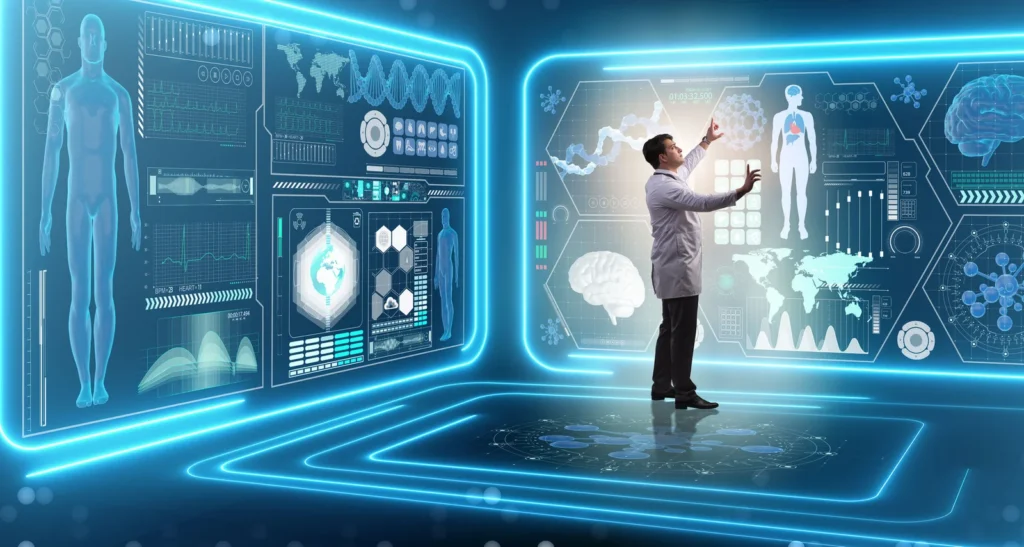The Role of Artificial Intelligence in Healthcare

Nowadays, Artificial Intelligence or AI, has become a leitmotiv in many spheres of our lives, and, of course, healthcare sphere cannot be an exception. Cognitive health technologies, the sub-field of AI applied to healthcare, have tremendous advantages in enhancing diagnostics’ quality, optimising administrative processes, and individualising treatment. This article seeks to discuss how AI can become useful in healthcare setting, the opportunity of implementing it, the issues it can foresee and bring to life, and what it may mean for future patients, medical workers, and the health care system in general.
Understanding: The Role of Artificial Intelligence in Healthcare
Artificial Intelligence can be defined as a sub-discipline of computer science that relates to the simulation of human intelligence in machines—basically, systems designed to make two types of decisions: rational and learned from experience. AI in the medical field includes machine learning, NLP, robotics, computer vision, among more. It includes state-of-the-art pattern identification of a host of health ailments, decision support systems, workflow optimisation, and patients’ well-being improvement.
Use of AI in Health Care

1. Medical Imaging and Diagnostics
The various algorithms for medical image analysis can be as accurate and efficient as if not more than human experts. Key applications include:
Radiology: The benefits of AI include the identification of abnormalities through X-rays, CT, MRI scans, mammograms, and other imaging that take less time in diagnosing the patients by the radiologists.
Pathology: AI assists pathologists in working on the tissue samples for cancer diagnosis and staging processes.
2. Clinical Decision Support
Healthcare Ais can handle a huge amount of data related to patients, medical research, and clinical protocols to generate recommendations for the patient and decision aids for the practitioners. This includes:
Predictive Analytics: Developing decision support tools and algorithms that can predict the likelihood of certain disease and specify patients that are most likely to be affected.
Risk Assessment: AI algorithms apply big data analytics to rank the risk factors of patients to enable proper prevention.
3. Personalised Medicine
In this method, information technology advanced through AI helps to personalise healthcare interventions and treatments depending on the patient’s characteristics, genetics, and history. This includes:
Genomics: Using genotype information, patient outcomes, and other variables to determine where a patient is at risk of getting an illness, what treatments are best for them, and how a patient can be cured.
Drug Discovery: Employing machine learning for identifying drug leads as well as for enhancement in the drug development operations.
4. Administrative Efficiency
AI streamlines administrative tasks, reduces paperwork, and improves operational efficiency within healthcare organisations. AI streamlines administrative tasks, reduces paperwork, and improves operational efficiency within healthcare organisations.
Medical Coding and Billing: Some of the common benefits of installing AI in the repeat business environment include; AI helps in automating coding and billing, hence eliminating errors in revenue cycle management.
Virtual Assistants: The patient’s lines and inquiries are addressed by the chatbots and virtual assistant, as well as the appointment booking and some rudimentary health information.
5. Remote Monitoring and Telemedicine
Smart devices and wearable sensors are used to monitor the objectively derived parameters of a patient continuously and perform complete remote patient care to contain chronic diseases at the initial stage itself. Telemedicine involves the use of AI in areas such as online consultations and even remote diagnosis.
6. Robot-Assisted Surgery
Robotic technologies help the surgeons by providing additional support in complicated operations while increasing accuracy, reducing tissue trauma, and thus shortening the amount of time that the patient needs for recovery.
Also Read: Astrology-for-health-professionals
Advantages of the Application of AI in Healthcare

1. The advantages are the enhanced abilities in diagnosing the state of health and the time effectiveness of the methods used.
AI expedites and improves the accuracy of diagnosis, which increases the chances of detecting diseases earlier and the patients’ quality of life.
2. Improving the client experience and customisation
AI improves treatment effectiveness and patients’ satisfaction due to the individual approach provided in treating the patients.
3. Increase operational efficiency and Cut Costs
Such practices of automating paperwork, among others, as well as general smooth integration of AI into organisational processes, decrease operational expenditures and optimise the usage of resources in the healthcare field in terms of making the delivery of services more efficient.
4. Progress in Medical Science and New Drug Development
AI shortens the duration it takes to come up with drugs by analysing large amounts of data and communicating the results much faster than humans.
5. Support for Healthcare Providers
Clinical decision support systems are the integrations of artificial intelligence in treatment aiding decision making, decreasing clinical mistakes, and enhancing patient management plans.
Challenges and Considerations
Despite its transformative potential, AI in healthcare faces several challenges:Despite its transformative potential, AI in healthcare faces several challenges:
Data Privacy and Security: Preventing patient data breaches when sharing information with staff, patients, and other facilities, as well as adhering to the rules of HIPAA.
Ethical Considerations: Discussing the ethical dilemmas of using AI to make medical decisions, patient consent and the algorithm’s prejudice.
Integration and Adoption: Challenges and strategies in successfully implementing AI solutions into current healthcare structures, such as the education of personnel and resistance to change.
Validation and Regulation: Promoting responsible AI through validation of its algorithms and reconciling substance with compliance across the entire industry.
Future Directions
The future of AI in healthcare holds promising developments:The future of AI in healthcare holds promising developments:
AI-Driven Precision Medicine: Stepping up the development of individualised treatments respecting genomic data and implying AI processing.
Enhanced Patient Engagement: Intelligent sign-assist systems for patient self-education, home telemonitoring, and health enhancing applications.
Global Health Accessibility: Through the development of AI technologies, health care imbalances are solved by providing efficient diagnostic tools and treatments in rural areas.
Collaborative AI: Applying artificial intelligence to enhance the decision-making process in clinical activities and to increase the chances and quality of healthcare delivery.
Conclusion: The Role of Artificial Intelligence in Healthcare
Therefore, AI in healthcare can be seen as a radical phenomenon that has the potential to completely change the healthcare industry, establish new definitions for medical service delivery, and provide support for enhanced patient outcomes and effective management of healthcare organisations. With the help of professed algorithms, machine learning, and data analytics,
AI can help medical experts diagnose diseases correctly, design appropriate medical treatment solutions for individual patients, and predict other diseases. Even though it may be rather difficult to avoid numerous issues concerning data privacy, ethical problems, and the lack of definite legislation in many countries concerning the use of artificial intelligence, the latter remains one of the most promising fields in healthcare, enhancing the quality of treatment and the effectiveness of treatment all across the globe.
FAQs (Frequently Asked Questions)
AI in healthcare: What is it?
Healthcare artificial intelligence can be defined as the ways and means by which healthcare can be provided through techniques inherited from artificial intelligence, such as algorithms and software to replicate the human brain in its functionality of analysing, interpreting, or understanding of the various medical data.
What are the current applications or uses of artificial intelligence in healthcare?
It has been incorporated in image diagnostics, targeted treatment, determining optimum drug dosages, virtual health care advice, patient prognoses, and, impending decisions for patient care and facility management.
That being said, what are the advantages of AI in the healthcare industry?
These are some gains attributed to AI: higher accuracy in diagnoses, individualised treatments, increased organisations’ effectiveness, a decrease in the overall costs of healthcare, accelerated discovery of drugs, and a better patient experience through the use of predictions.
One may wonder, what are the issues that are likely to be faced in the integration of AI in healthcare?
The issues include data privacy and protection, the requirement of accurate data for training the AI models, the ethical concerns of AI decisions, policies, and laws, and bias in AI systems.
In what ways will the integration of AI increase patient value?
Machine intelligence can make specific contributions to patient care by providing faster and more precise diagnoses of diseases, suggesting specific treatment plans based on a patient’s health record, anticipating disease epidemics, minimising medical mistakes, and enhancing the general efficiency of the health care system.
Is AI coming to replace healthcare personnel?
AI is not seeking to replace healthcare professionals, but to enhance them. Doctors, nurses, and other carers are benefited by it, as it will help them come to the right conclusions and enhance the quality of care supplied to patients.
To what extent do you think AI would develop in the field of healthcare?
AI in healthcare already has a bright future ahead, as inventions in AI technologies are not stopping and will only keep on improving the system’s function in disease control, detection, treatment, and personalised approach delivery.
As everyone knows that the implementation of AI is needed in all fields, including healthcare, the concerned authorities and healthcare organisations have to know how to plan and implement it properly:
Derived from the research conclusions, here are some recommendations to health care institutions on how to effectively integrate AI in their operations: Infrastructure development, staff AI training, developing the health care and AI code of ethics, partnership and collaboration, and AI compliance are among other areas that require institutional attention.